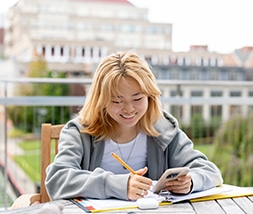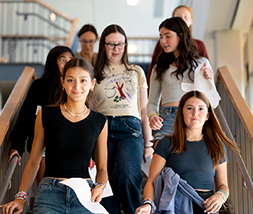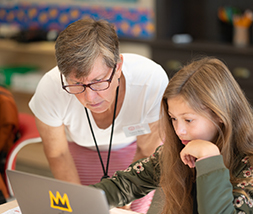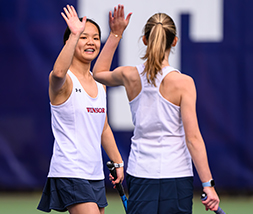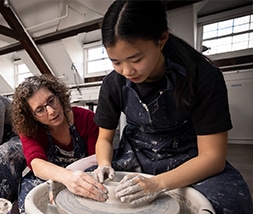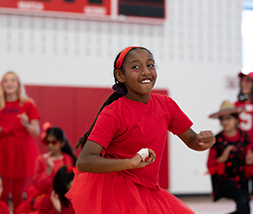129 Years Later, Winsor Speech and Debate Continues to Equip Students with an Interdisciplinary Skillset
by Nika Bigelow ’25
On January 20, 2024, three members of Winsor’s Speech and Debate Club attended the school’s first-ever Massachusetts Speech & Debate League (MSDL) tournament at the Boston Latin School. I, as Secretary of Winsor Debate, was one of those three members, and had the opportunity to experience an utterly different style of debate tournament than what Winsor students are used to.
But first, a bit of background. Founded in 1895, Winsor Speech and Debate is a cornerstone of the Winsor experience for the 20 members of the team, myself included. Winsor has been a member of the Debating Association of New England Schools (DANEIS) alongside schools like Roxbury Latin, Hotchkiss, Deerfield, and Groton since the organization’s founding in 1978. The tournaments we have attended since that time have been exclusively DANEIS tournaments. The fifteen-odd such annual tournaments are either debate tournaments— typically consisting of three rounds of parliamentary debate—or speech tournaments— which consist of interpretive readings, a choice of persuasive speeches or comedic after-dinner speeches, and a choice of ethical dilemmas or impromptu speaking.
Two additional tournaments exist: International Independent Schools Public Speaking Competition (IISPSC) and the World Individual Debating and Public Speaking Championship (WIDPSC). For IISPSC, member schools each send three competitors for the four-day tournament to compete in the aforementioned events. Qualifying for WIDPSC, however, requires winning at IISPSC or one of the fifteen annual DANEIS tournaments, so no schools are guaranteed spots. Having competed at the 2023 World Individual Debating and Public Speaking Championship in Durban, South Africa, I came away with a newfound respect and understanding for what truly incredible debating looks like. I was also able to meet fellow competitors from the United States, many of which I’m still friends with to this day, and exchange cultures and debate styles with competitors from all over the world, from South Africa, to China, to Canada.
MSDL tournaments, on the other hand—like the one at Boston Latin School in January—are attended by students at Massachusetts public schools and a few private schools, and have a much wider array of choices, which range from radio broadcast, to competitive group discussion, to Lincoln-Douglas one-on-one debate. At the Boston Latin tournament, I chose to compete in impromptu speaking, which is much like impromptu within the DANEIS league but with slightly different timing. However, instead of impromptu topics being random as in DANEIS—anything from a quote, to a proper noun, to an abstract noun—the words for each round were within defined categories. In my last room, the category was food, so one boy talked about hotdogs, while a girl talked about mustard. What struck me most, though, was the difference in judging: much like between DANEIS judging and judging at Worlds, the judges valued entirely different aspects of competitors’ speeches, and the students adjusted accordingly. I observed that at the MSDL tournament, most speeches started with a lengthy personal anecdote, often involving a quite dramatic performance, and often adhered closely to various instances where the topic is evident, describing each without necessarily tying them together. In DANEIS, a well-done impromptu speech often centers on the rhetoric, the ability to tie together a number of quite different examples that each clearly relate back to the original topic in one cohesive thesis. In Worlds, I observed similar differences in what judges gravitated toward: while a number of United States coaches valued fast-paced analysis and political examples, judges from other countries seemed to value a slower approach focused more on persuasiveness and expressiveness, even in debate events. After competing at the Boston Latin MSDL Tournament, and qualifying for the MSDL State Tournament at Catholic Memorial High School, I hope to be able to compete at more such tournaments in the future, both to familiarize myself with new debate styles and events, and to stay involved in the kind community I was welcomed by at Boston Latin.
Going into high school, I had many interests, and a nagging feeling that I should try debate. And joining debate proved to be one of the best decisions I’ve made, both because it honed my public speaking and proved synergistic with academics. It has opened myriad paths for me in ways I could never have expected, from driving across New England for tournaments, to traveling to South Africa to compete against the world’s finest high school debaters, to educating Lower Schoolers about what Winsor Speech and Debate actually entails. It has allowed me to hone my critical thinking skills, to become fearless in the face of public speaking, and has prepared me for other academic pursuits in ways I couldn’t even fathom. The speedy thinking required in a debate round translates well to writing essay drafts, putting together a chemistry post-lab report, and even performing a solo in Illumina, the school choir. And not only did debate prepare me for school work, but it also made Mock Trial and Model UN feel natural: cross-examinations in Mock Trial are akin to Cross-Ex Debates in DANEIS, albeit with more law and preparation, closing arguments resemble the memorized persuasive speeches at DANEIS speech tournaments, presenting at Model UN feels much like one long Parliamentary Debate rebuttal, and Unmoderated Caucuses are essentially impromptu speeches, only shorter and more factual rather than analytical. The applications of debate are not only endless, but invaluable. From entering the new frontier of MSDL Tournaments, to contributing in Russian Literature class discussions, to presenting a solution in AP Chemistry, debate has equipped me with a versatile, interdisciplinary skillset and a myriad of opportunities to learn from others and engage in intellectual discourse.

